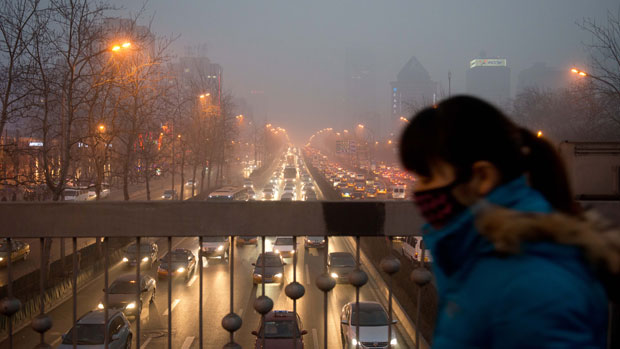Panasonic offers pollution pay to workers in 'toxic' Beijing
'Nuclear winter' in Beijing leads Panasonic to compensate staff for severity of Chinese pollution

A free daily email with the biggest news stories of the day – and the best features from TheWeek.com
You are now subscribed
Your newsletter sign-up was successful
JAPANESE electronics firm Panasonic has announced a new pollution-related "hardship bonus" to workers who live in Beijing.
Employees in China's smog-plagued capital will receive a bump in pay for enduring conditions Chinese scientists say are beginning to resemble a "nuclear winter". The deal comes as part of Panasonic's latest round of pay negotiations, the BBC reports.
Chinese premier Li Keqiang declared a "war on pollution" in his opening address at this year's annual meeting of the Chinese parliament, known as the National People's Congress.
The Week
Escape your echo chamber. Get the facts behind the news, plus analysis from multiple perspectives.

Sign up for The Week's Free Newsletters
From our morning news briefing to a weekly Good News Newsletter, get the best of The Week delivered directly to your inbox.
From our morning news briefing to a weekly Good News Newsletter, get the best of The Week delivered directly to your inbox.
Air pollution regularly reaches hazardous levels in China. Last week, scientists compared the situation to a nuclear winter and revealed that the toxic smog was now even impeding photosynthesis in plants, something that could end up "wreaking havoc" on the country's food supply.
Conditions in China are so bad that many Japanese workers are reluctant to relocate, but Panasonic is hoping that the pay increase will create an incentive to move.
The Japanese electronics firm is the first to explicitly acknowledge the severity of the problem, the Financial Times says.
"That's the first time I've heard any company be quite so brazen about it," said Robert Parkinson, head of Beijing-based recruiter RMG Selection. "The normal style would be to dress it up as a 'developing country allowance'. It's a bit like saying we know we are exposing you to something that could be life-threatening. We're going to admit it and compensate you for it."
A free daily email with the biggest news stories of the day – and the best features from TheWeek.com
Several Western embassies have installed air filtration systems for diplomats living in Beijing, and many global firms are struggling to convince foreign workers to move to the Chinese capital, the Financial Times says.
Governmental efforts to reduce smog have had limited success, due to the country's reliance on coal power. A recent analysis of air quality across 74 Chinese cities revealed that only four met national air quality standards.
-
 Crisis in Cuba: a ‘golden opportunity’ for Washington?
Crisis in Cuba: a ‘golden opportunity’ for Washington?Talking Point The Trump administration is applying the pressure, and with Latin America swinging to the right, Havana is becoming more ‘politically isolated’
-
 5 thoroughly redacted cartoons about Pam Bondi protecting predators
5 thoroughly redacted cartoons about Pam Bondi protecting predatorsCartoons Artists take on the real victim, types of protection, and more
-
 Palestine Action and the trouble with defining terrorism
Palestine Action and the trouble with defining terrorismIn the Spotlight The issues with proscribing the group ‘became apparent as soon as the police began putting it into practice’
-
 Epstein files topple law CEO, roil UK government
Epstein files topple law CEO, roil UK governmentSpeed Read Peter Mandelson, Britain’s former ambassador to the US, is caught up in the scandal
-
 Iran and US prepare to meet after skirmishes
Iran and US prepare to meet after skirmishesSpeed Read The incident comes amid heightened tensions in the Middle East
-
 Israel retrieves final hostage’s body from Gaza
Israel retrieves final hostage’s body from GazaSpeed Read The 24-year-old police officer was killed during the initial Hamas attack
-
 China’s Xi targets top general in growing purge
China’s Xi targets top general in growing purgeSpeed Read Zhang Youxia is being investigated over ‘grave violations’ of the law
-
 Panama and Canada are negotiating over a crucial copper mine
Panama and Canada are negotiating over a crucial copper mineIn the Spotlight Panama is set to make a final decision on the mine this summer
-
 Why Greenland’s natural resources are nearly impossible to mine
Why Greenland’s natural resources are nearly impossible to mineThe Explainer The country’s natural landscape makes the task extremely difficult
-
 Iran cuts internet as protests escalate
Iran cuts internet as protests escalateSpeed Reada Government buildings across the country have been set on fire
-
 US nabs ‘shadow’ tanker claimed by Russia
US nabs ‘shadow’ tanker claimed by RussiaSpeed Read The ship was one of two vessels seized by the US military